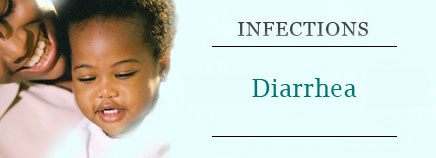
Most kids battle diarrhea — frequent, runny bowel movements (poop) — from time to time. The good news is that it usually doesn’t last long and is more annoying than dangerous. Still, it’s important to know how to relieve and even prevent diarrhea.
What Causes Diarrhea?
Diarrhea is usually brought on by gastrointestinal (GI) infections caused by germs (viruses, bacteria, or parasites).
Viruses
Viral gastroenteritis (often called the “stomach flu”) is a common cause of diarrhea and, often, nausea and vomiting. It can spread through a household, school, or childcare center quickly. The symptoms usually last just a few days, but kids (especially babies) who can’t get enough fluids can become dehydrated.
Rotavirus infection, a frequent cause of diarrhea in kids, can bring on explosive, watery diarrhea. Outbreaks are more common in the winter and early spring months, especially in childcare centers. A very effective rotavirus vaccine is now recommended for infants.
Enteroviruses, particularly coxsackievirus, also can cause diarrhea in kids, especially during the summer months.
Bacteria and Parasites
Many different types of bacteria and parasites can cause GI and diarrhea, including E. coli, Salmonella, Campylobacter, and Shigella bacteria; and Giardia and Cryptosporidium parasites.
Sometimes, diarrhea can be due to a non-infectious disease or condition, especially if it lasts several weeks or longer. In those cases, it could be a sign of a food allergy, lactose intolerance, or diseases of the gastrointestinal tract, such as celiac disease and inflammatory bowel disease.
What Are the Symptoms?
Symptoms usually start with crampy abdominal pain followed by diarrhea that usually lasts no more than a few days. Infections with many of the viruses, bacteria, and parasites that cause diarrhea also can bring on other symptoms, such as:
- fever
- loss of appetite
- nausea
- vomiting
- weight loss
- dehydration
In cases of viral gastroenteritis, kids often develop fever and vomiting first, followed by diarrhea.
When to Call the Doctor
Call your doctor if your child has diarrhea and is younger than 6 months old or has:
- a severe or long-lasting episode of diarrhea
- fever of 102°F or higher
- repeated vomiting, or refusal to drink fluids
- severe abdominal pain
- diarrhea that has blood or mucus
Call the doctor immediately if your child seems to be dehydrated. Signs include:
- dry or sticky mouth
- few or no tears when crying
- eyes that look sunken
- in a baby, the soft spot (fontanelle) on top of the head looks sunken
- peeing less or fewer wet diapers
- dry, cool skin
- irritability
- drowsiness or dizziness
How Can I Care for My Child?
Mild diarrhea usually isn’t cause for concern if your child is acting normally and drinking and eating enough. It usually passes in a few days, and kids recover with home care, rest, and plenty of fluids.
Kids who aren’t dehydrated or vomiting can continue eating and drinking as usual. In fact, continuing a regular diet may even shorten the diarrhea episode. You may want to serve smaller portions of food until the diarrhea ends.
Do not give your child an over-the-counter anti-diarrhea medicine unless your doctor gives the OK.
The goal when treating diarrhea is to replace the lost fluids and electrolytes (salts and minerals). For kids who aren’t dehydrated, doctors recommend:
- Continuing with a regular diet and giving more liquids to replace those lost while the diarrhea continues.
- Offering additional breastmilk or formula to infants.
For kids who show signs of mild dehydration, doctors often recommend rehydration with an oral rehydration solution (ORS). These are available in most grocery stores and drugstores without a prescription and replace body fluids quickly. Your doctor will tell you what kind to give, how much, and for how long.
Kids should never be rehydrated with water alone because it doesn’t contain the right mix of sodium, potassium, and other important minerals and nutrients.
In some cases, kids with severe diarrhea may need to get IV fluids at the hospital for a few hours to help combat dehydration.
Can Diarrhea Be Prevented?
It’s almost impossible to prevent kids from ever getting diarrhea. But here are some ways to make it less likely:
- Make sure kids wash their hands well and often, especially after using the toilet and before eating. Hand washing is the most effective way to prevent diarrheal infections that pass from person to person. Dirty hands carry germs into the body when kids bite their nails, suck their thumbs, eat with their fingers, or put any part of their hands into their mouths.
- Keep bathroom surfaces clean.
- Wash fruits and vegetables well before eating.
- Wash kitchen counters and cooking utensils thoroughly after they’ve been in contact with raw meat, especially poultry.
- Refrigerate meats as soon as possible after bringing them home from the store. Cook cook them until they’re no longer pink. Refrigerate all leftovers as soon as possible.
- Never drink from streams, springs, or lakes unless local health authorities have certified that the water is safe for drinking.
- Avoid washing pet cages or bowls in the same sink that you use to prepare food. And keep pet feeding areas separate from family eating areas.

